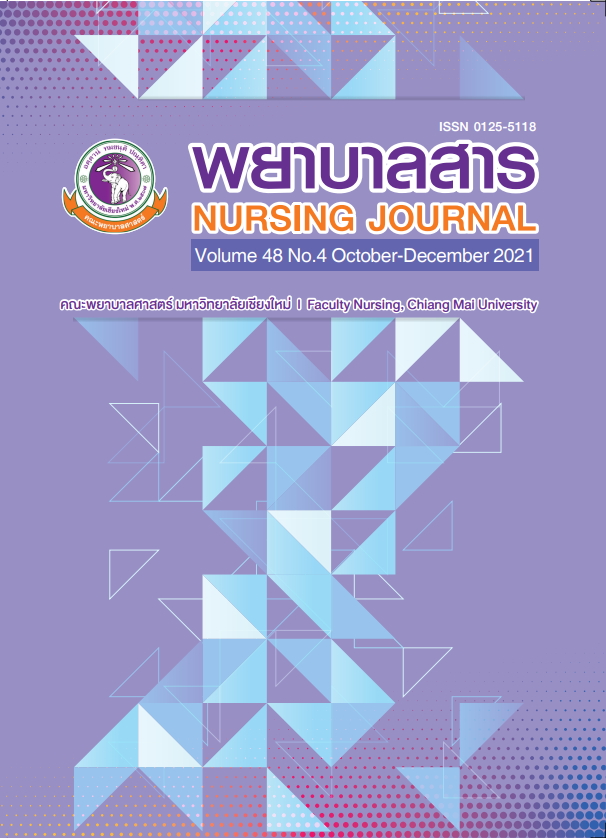Effect of the Participatory Learning Program on Foot Ulcer Prevention Among Uncontrolled Type 2 Diabetic Persons in Community
Keywords:
Participatory learning program, prevention of foot ulceration, type-2 uncontrolled diabetic personsAbstract
The prevalence of foot ulceration in diabetic patients is increasing. However, proper self-care by diabetic patients can prevent foot ulceration in uncontrolled diabetic persons. This quasi-experimental study with two group pretest - posttest design aimed to examine the effect of the participatory learning program on foot ulcer prevention among uncontrolled type 2 diabetic persons in a community. Fifty-two type-2 uncontrolled diabetic patients in Saraphi District were recruited for the study; 26 attended participatory learning while the other 26 received traditional suggestions from public health officials. Two types of tools were used in the study: 1) experimental tools consisting of a research tool entailing a participatory learning program on preventing foot ulceration in type-2 uncontrolled diabetic patients, a prevention manual, and a foot care manual for diabetic patients according to preventive and therapeutic practices for those with foot complications, and 2) a data collection tool comprised of questionnaires assessing general information about diabetic patients, knowledge of the prevention of foot ulceration in type-2 diabetic patients, and the prevention of foot ulceration in these patients. Data were analyzed using descriptive statistics, the Chi-Square Test, and the Wilcoxon Matched Pairs Signed-Ranks Test, as well as the Mann–Whitney U test, depending on the characteristics of data. The result of this study showed that: The knowledge and practice scores regarding prevention of foot ulceration in type-2 uncontrolled diabetic patients were significantly higher after attending the participatory learning than before (p < .001 and p = .006 respectively). The knowledge and practice scores were significantly higher in the experimental group than in the control group (p < .001 and p = .005, respectively). The results show that the developed participatory learning program for the prevention of foot ulceration in type-2 uncontrolled diabetic patients in community made participants more knowledgeable and gave them a better understanding of how to prevent foot ulceration.
References
Anusornteerakul, S., & Janthong, P. (2014). The effects of participatory learning program on diet control behaviors among pregnant women with gestational diabetes mellitus. Journal of Nursing Science and Health, 37(1), 52-59. (in Thai)
Chiangpiew, N. (2015). The effectiveness of foot exercise on lower extremity blood supply and leg muscle strength among type 2 diabetes mellitus patients. Thai Journal of Nursing, 61(2), 1-5. (in Thai)
Chiangmai Provincial Public Health Office. (2016). Health data center. (in Thai) Retrieved from https://www.chiangmaihealth.go.th/cmpho_web/
Chiangmai Provincial Public Health Office. (2019). Health data center. (in Thai) Retrieved from https://www.chiangmaihealth.go.th/cmpho_web/
Chiangmai Provincial Public Health Office. (2019). Information center. (in Thai) Retrieved from https://www.chiangmaihealth.go.th/cmpho_web/all_it.php
Cohen, J. (1977). Statistical power analysis for the behavioral sciences (Rev. ed.). Washington D.C.: Lawrence Erlbaum Associates.
Department of Mental Health. (2001). Information center. (in Thai) Retrieved from http://dmsic.moph.go.th/index/detail/8297
Khammanee, T. (2014). Media management powered. (in Thai) Retrieved from http://doc2.clib.psu.ac.th/public13/266172.pdf
Kolb, D. A. (1984). Participatory learning approach: A research agenda. Technical Report Version 1.0.
Ministry of Public Health. (2017). Health data center. (in Thai) Retrieved from https://hdcservice.moph.go.th/hdc/main/index.php
Piromchom, A., & Hansakul, A. (2012). Factors influenced with self-care behaviors in type 2 diabetes mellitus patients in Nongbuarawae District, Chaiyaphum Province. (in Thai)
Prakaisakun, J., Sirisawang, W., & Chawapong, W. (2018). Quality of life of non-insulin dependent diabetes patients at Sarapee Hospital, Chiang Mai Province. Ganesha Journal, 14(1), 1-15. (in Thai)
Siriniyomchai, C., Boonnak, N., Sriwongwant, S., & Wannachai, P. (2019). Development of Foot Care Model among patients with diabetes mellitus in community: A Case Study of Sunpuloei Community. Nursing Science Journal of Thailand, 37(2), 13-25. (in Thai)
Siriniyomchai, C. (2019). Nurse’s Roles in management of diabetic foot ulcers. Siriraj Med Bull, 12(2), 132-139. (in Thai)
Sawanyavisuthi, P., & Sanchaisuriya, P. (2013). The effectiveness of participatory learning process to modify food consumption behavior of diabetes mellitus type 2 patients with nephropathy attending Kumphawapi Primary Care Unit, Udonthani Province. KKU Journal for Public Health Research, 7(1), 1-8. (in Thai)
Downloads
Published
How to Cite
Issue
Section
License
บทความที่ได้รับการตีพิมพ์เป็นลิขสิทธิ์ของวารสารพยาบาลสาร
ข้อความที่ปรากฏในบทความแต่ละเรื่องในวารสารวิชาการเล่มนี้เป็นความคิดเห็นส่วนตัวของผู้เขียนแต่ละท่านไม่เกี่ยวข้องกับมหาวิทยาลัยเชียงใหม่ และคณาจารย์ท่านอื่นๆในมหาวิทยาลัยฯ แต่อย่างใด ความรับผิดชอบองค์ประกอบทั้งหมดของบทความแต่ละเรื่องเป็นของผู้เขียนแต่ละท่าน หากมีความผิดพลาดใด ๆ ผู้เขียนแต่ละท่านจะรับผิดชอบบทความของตนเองแต่ผู้เดียว






